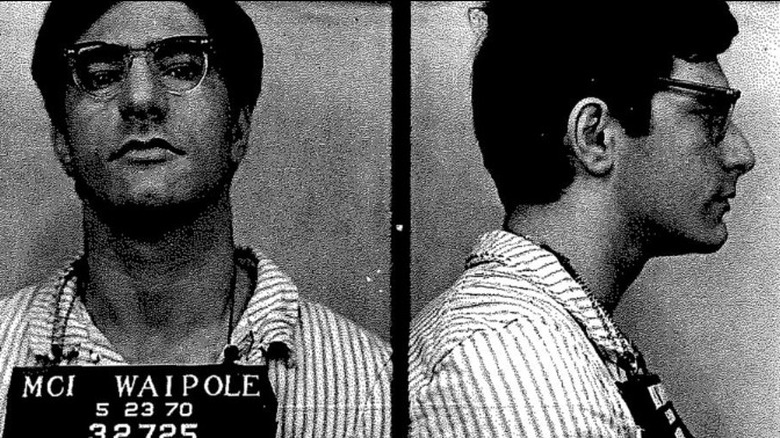This May Have Been The Cape Cod Vampire's Motive To Kill
In the late 1960s, a handyman named Antone "Tony" Costa was staying at a boarding house in Provincetown, Massachusetts. By all accounts, Costa was a charismatic young man, who was intelligent and seemingly kind. As reported by Boston Magazine, Costa had several friends, who looked to him as their leader and referred to him as "Sire." In addition to offering his followers companionship, Boston Magazine reports he often provided them with hallucinogenic drugs.
Although Costa's friends thought he was generous and charming, their "Sire" had a dark side. In fact, they were risking their lives simply by being in his presence.
On March 6, 1969, Costa was arrested and charged with murder in the deaths of four women. As reported by Liza Rodman, author of the true-crime memoir "The Babysitter" based on Costa, authorities in South Yarmouth, Massachusetts, found the women's mutilated bodies in the South Truro woods, near an old fire road -– which was known by locals as a "lovers' lane."
Bristol County District Attorney Edmund Dinis, who announced the arrest, said all of the bodies were found with marks indicating the victims had been bitten by their attacker. He also said the bodies had been dismembered and women's hearts had been removed from their bodies and were not found at the scene. The macabre nature of the murders prompted media outlets to refer to Costa as the "Cape Cod Vampire." Rodman reports it was eventually revealed that Dinis misread the medical examiner's report, and the victims were not bitten and their hearts were not actually removed.
Tony Costa claimed his alter ego encouraged him to kill
Although the misinformation was corrected, the nickname stuck, and Tony Costa is known as the Cape Cod Vampire to this day. As reported by Liz Rodman, there is no doubt Costa was a brutal killer and a necrophiliac, who savagely dismembered his victims. However, there was simply no evidence that he consumed any of the women, kept their organs, or had a specific fascination with vampires.
According to "Helltown: The Untold Story of a Serial Killer on Cape Cod," Costa blamed a friend — an alter ego — named Cory for convincing him to commit the crimes (via Boston Magazine). The Line-Up reported the mysterious friend assisted him in killing the women, and ultimately burying the bodies. It is unclear whether "Cory" was a symptom of mental illness or if Costa fabricated Cory to avoid taking partial blame for the murders.
Costa was ultimately convicted for the murders of Patricia Walsh and Mary Anne Wysocki. However, AETV reports he was suspected of killing at least three others. Costa was serving a life sentence at Massachusetts' Walpole Correctional Institution when he died by suicide in 1974.
As reported by AETV, there were signs throughout Costa's childhood and adolescence that may have predicted his future as a serial killer. According to reports, Costa became particularly interested in taxidermy at a young age. He also reportedly harmed small animals and had attempted to sexually assault someone on at least one occasion. Costa also had an unusually close relationship with his mother, as his father was killed during World War II when Costa was an infant.
Costa had an unusual relationship with his mother
Author and journalist Casey Sherman, who wrote the book "Helltown: The Untold Story of a Serial Killer on Cape Cod," about Costa, discussed Costa's relationship with his mother during an interview with AETV. In the interview, Sherman said Tony Costa was dependent on his mother and essentially "wanted to keep [her] all to himself." When his mother went on to remarry, and ultimately had another child, Sherman believes it "created a void in Costa's heart and brain." Sherman also suggested Costa may have felt an inappropriate attraction toward his mother.
Sherman said Costa eventually developed a "love-hate relationship" with his mother and may have projected his anger onto his victims. During the interview with AETV, Sherman said, "Tony Costa was the most brutal serial killer since Jack the Ripper. I've studied the autopsy photos, I've studied the crime scene photos ... There's a real brutality here that Tony Costa projected onto these women, and I think it all goes back to his relationship with his mother." Sherman compared Costa with the fictional character Norman Bates in Alfred Hitchcock's film "Psycho," who kept his mother's body in the house following her death and believed she was encouraging him to commit murder.
Although Sherman's theories are compelling, it is unclear what actually motivated Costa to commit murder, as he never disclosed why he committed the crimes. It is also unclear whether Costa was mentally ill, as he was never diagnosed as having any mental condition.


